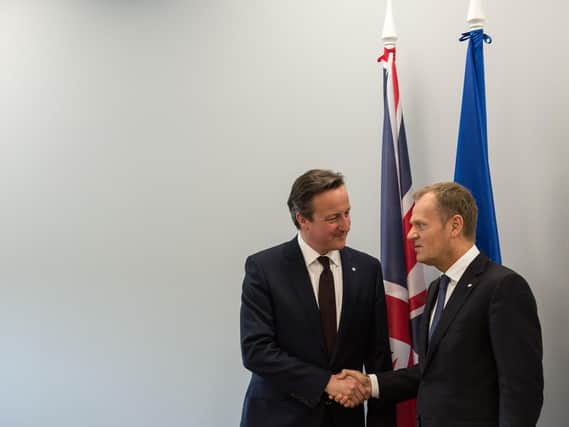EU referendum: Migrant benefits major sticking point on reform, Donald Tusk says


In a much anticipated response to his plans to renegotiate Britain's place in the EU, the Prime Minister has been told by Mr Tusk that refusing to pay migrants benefits for four years is not something other member states would tolerate.
Describing Mr Cameron's plans as 'difficult', he went on to say: "There is presently no consensus on the request that people coming to Britain from the EU must live there and contribute for four years before they qualify for in-work benefits or social housing.
Advertisement
Hide AdAdvertisement
Hide Ad"This is certainly an issue where we need to hear more from the British Prime Minister and an open debate among ourselves before proceeding further."
Mr Tusk's response to Mr Cameron's first attempt at renegotiating the country's position in Europe has been dealt a significant blow by refusing to give countenance to Britain's welfare plans. He also said Britain's uncertain future within the EU was 'destabilising'.
However he said overall good progress was being made and a final reform proposal should be in place by February 2016.
Once David Cameron has the final terms of reform in place, it will form the basis of his question to the British public in-out EU referendum scheduled for 2017.
Advertisement
Hide AdAdvertisement
Hide AdMr Cameron asked the European Council in November to allow him to:
1) Create a set of binding principles that guarantee fairness between Euro and non-Euro countries.
2) Enhance competitiveness and cut red tape for business.
3) Exempt Britain from an ‘ever closer union’ and bolster national parliaments through legally binding and irreversible changes.
4) Tackle abuses of the right to free movement, and enable Britain to control migration. Migrants to Britain from the EU must live here and contribute for 4 years before they qualify for in work benefits or social housing.
Advertisement
Hide AdAdvertisement
Hide AdMr Tusk said the European Council looked favourably on finding a way of allowing Member States that are not in the Euro the opportunity to raise concerns about the Euro.
And also agreed competitiveness needs 'further work' on better regulation and on lessening the burdens on business and said there was no issue with allowing Britain to reject immersion into an "ever closer union" with other EU states.
However he said 'social benefits and the free movement of persons' is the 'most delicate' and will require a substantive political debate at our December meeting.
Mr Tusk said: "All in all it is my assessment that so far we have made good progress. We need some more time to sort out the precise drafting on all of these issues, including the exact legal form the final deal will take.
Advertisement
Hide AdAdvertisement
Hide Ad"We also have to overcome the substantial political differences that we still have on the issue of social benefits and free movement. The December European Council should address all the political dilemmas related to this process. Based on a substantive political discussion we should be able to prepare a concrete proposal to be finally adopted in February.
"Let me finally share with you some political remarks. All involved must take their part of responsibility. I will act as an honest broker but all Member States and the institutions must show readiness for compromise for this process to succeed. Our goal is to find solutions that will meet the expectations of the British Prime Minister, while cementing the foundations on which the EU is based.
"Uncertainty about the future of the UK in the European Union is a destabilizing factor. That is why we must find a way to answer the British concerns as quickly as possible."